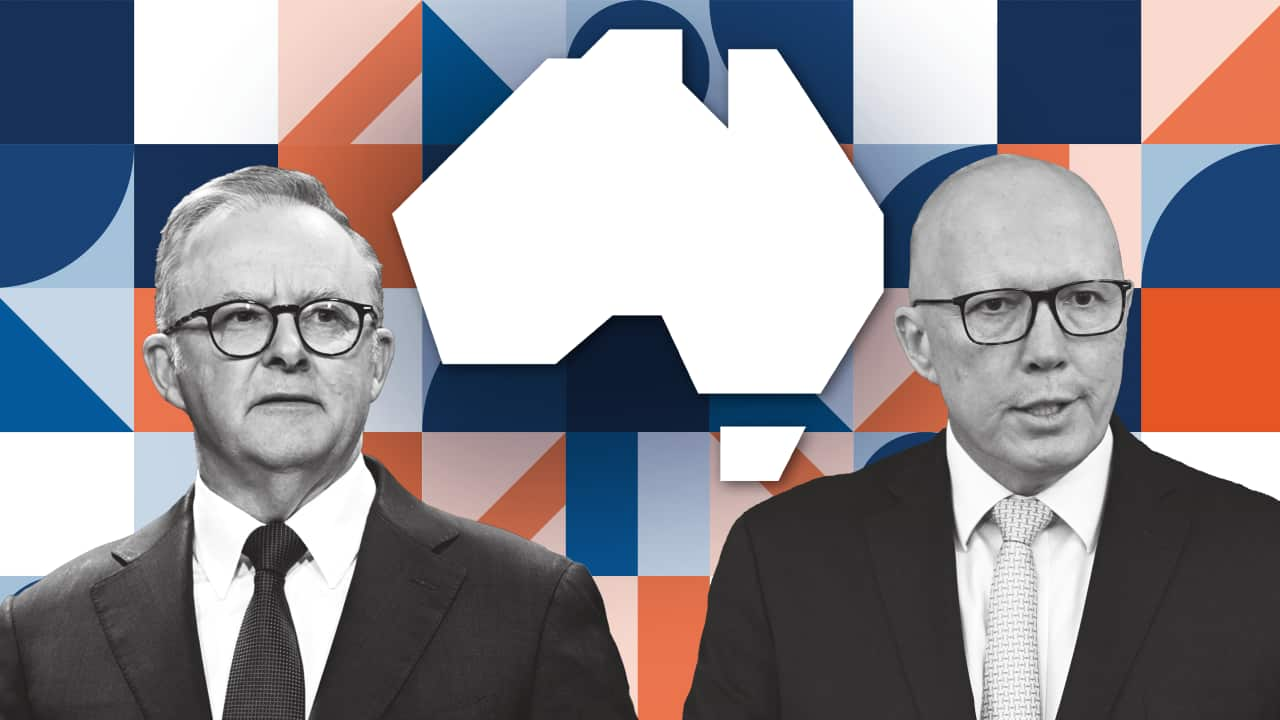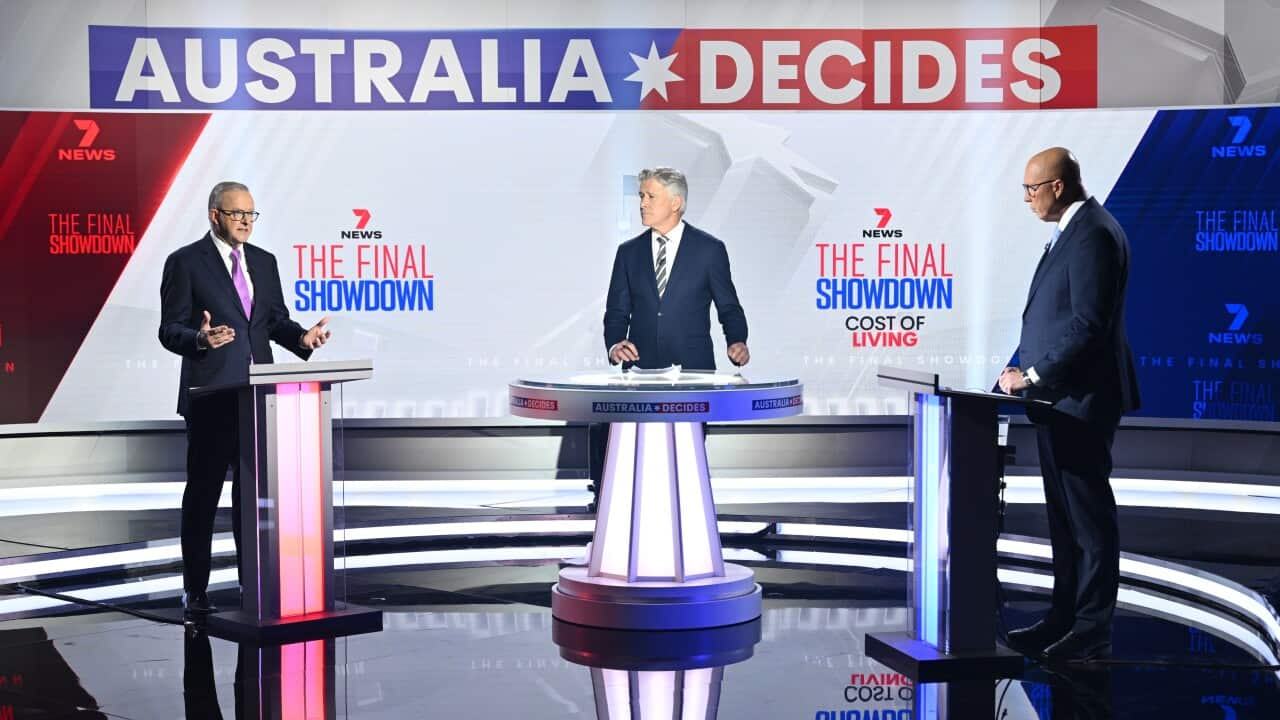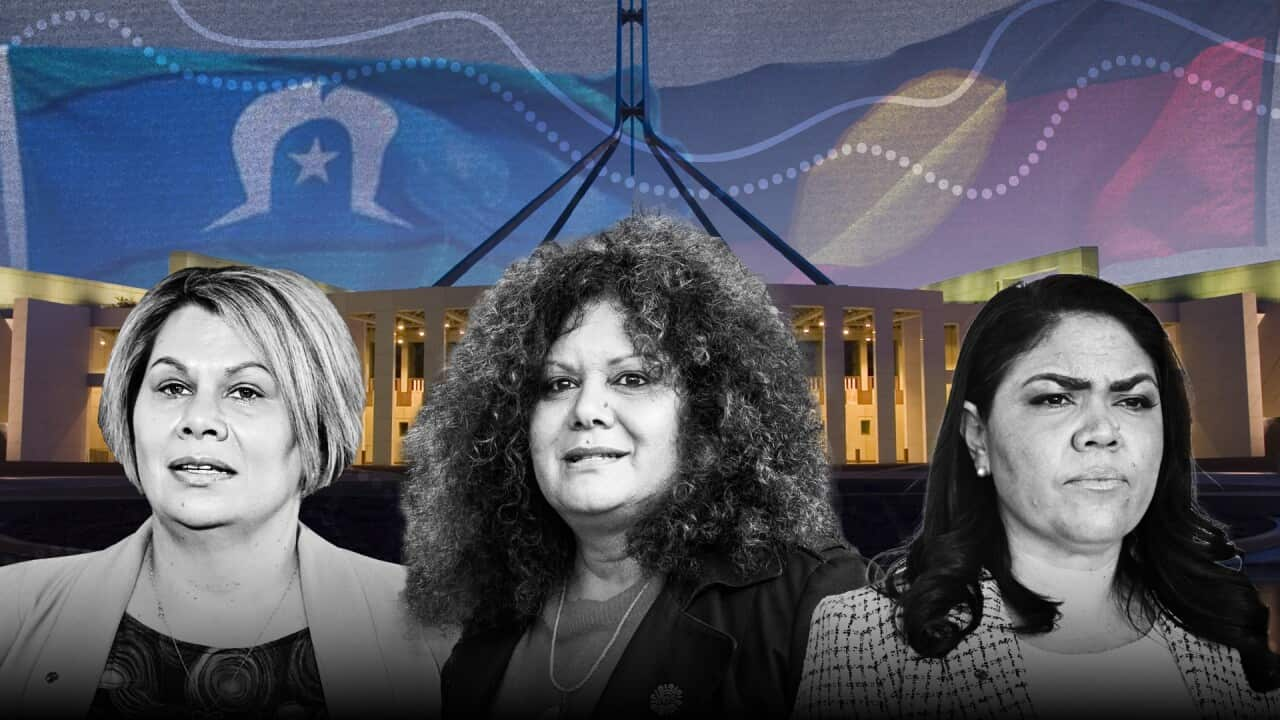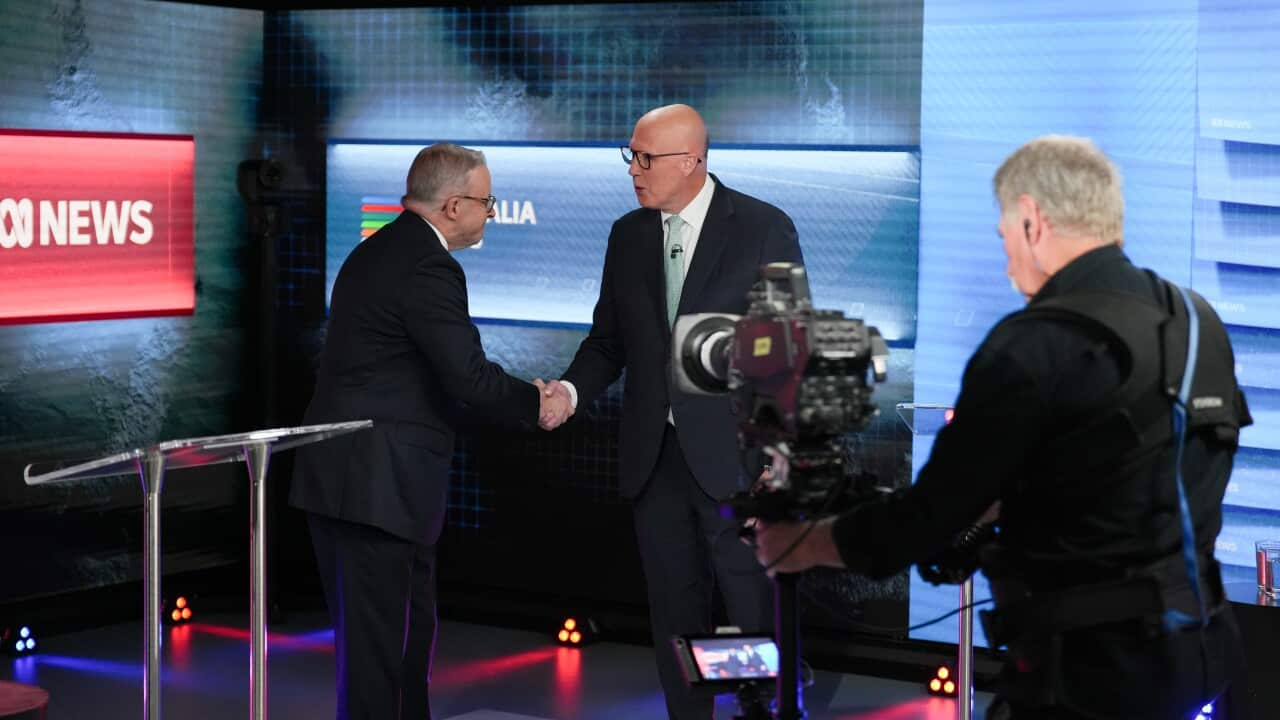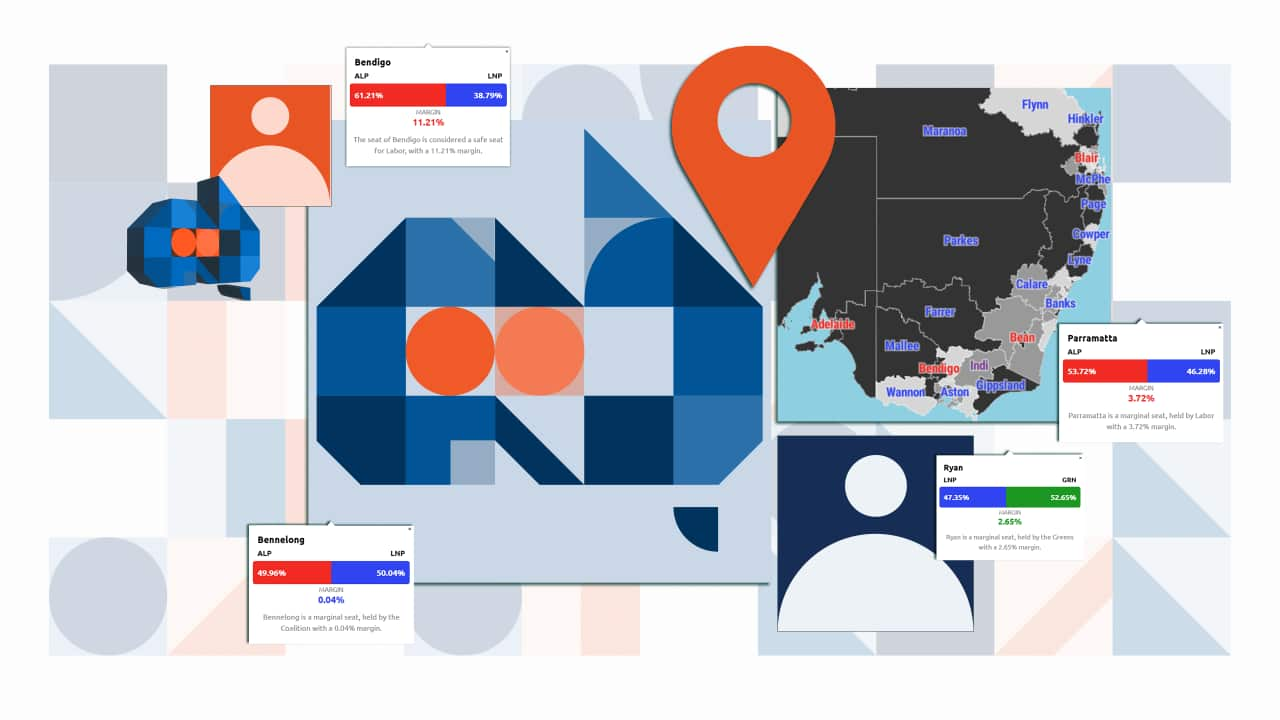For a campaign of largely small ideas, this election has still managed to draw a popcorn crowd.
Prime Minister Anthony Albanese and Opposition leader Peter Dutton's three free-to-air debates drew about a million viewers each, with the leaders over the price of eggs, the science of climate change and the biggest porkies they believe their opponent is telling about them.
The campaign's five-week reality show hasn't been Married at First Sight-style gripping, can't-look-away viewing. It's been a slow burn.
Days of dull and predictable marginal seat hopping have been peppered with compelling episodes, many of which have been amplified by the chaos in the White House.
United States President Donald Trump's agenda has been like a persistent, dark cloud threatening to storm at any moment and often while Australians are sleeping.
The Trump tariff decision and its changed the campaign and recast the leaders.
Polling and research company Redbridge tracked a demonstrable slump in opposition popularity as Trump moved his bags back into the White House and .
Just a few months before, the Coalition was viewed as having the momentum and the ability to ride an international surge in conservative support, and a trend to boot out incumbents.
But while delayed the calling of the election, there was already a reset in the political weather pattern forming.
The images we keep seeing on repeat
Suddenly it was budget time and Albanese and Treasurer Jim Chalmers had the spotlight for a week-long sell of their economic agenda and then the chance to take the wind out of the Opposition leader's reply announcements — by .
Some parts of the campaign have felt like groundhog day, with the prime minister regularly appearing against a green Medicare backdrop holding up his prized card to sell the government's , while the Opposition leader fills up at yet another petrol bowser to plug his to the price of fuel for 12 months.
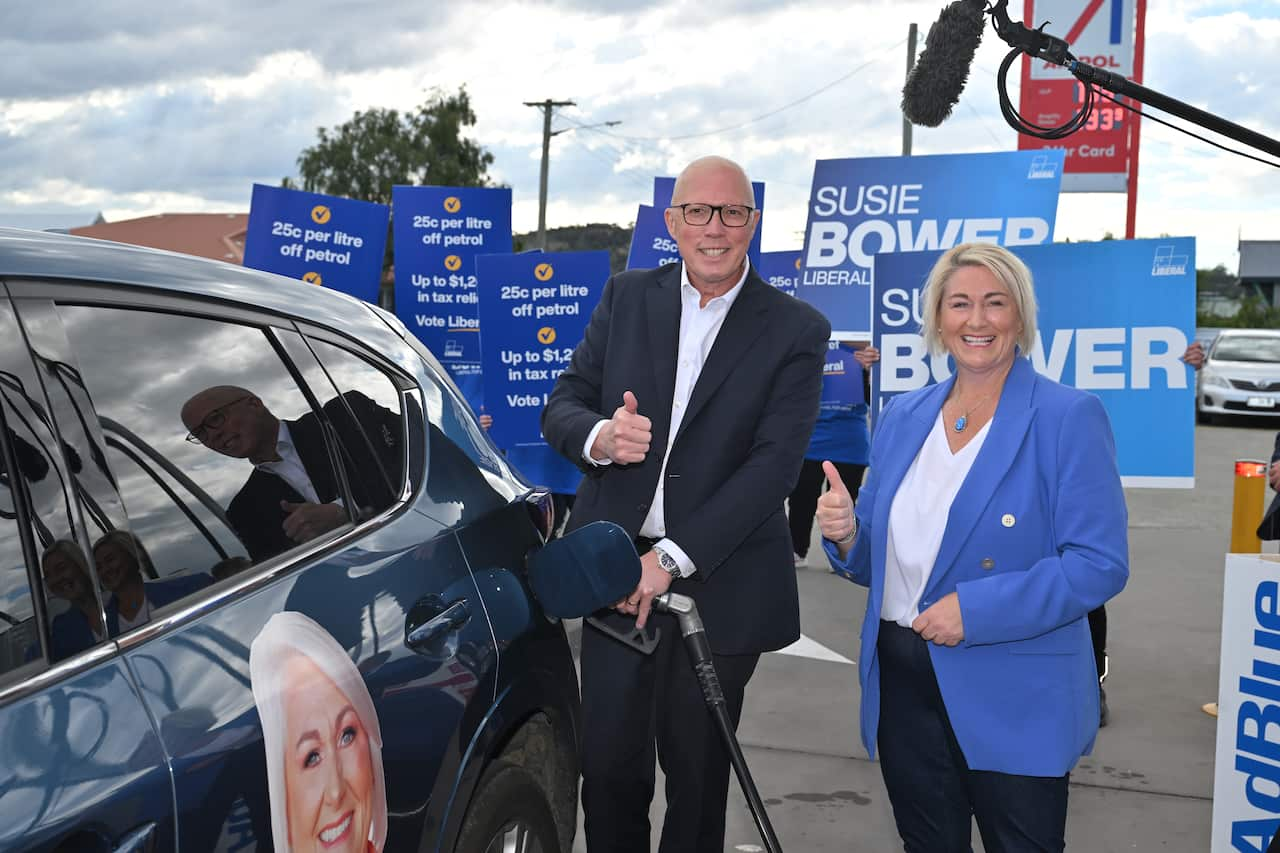
Another day, another petrol station. Peter Dutton with Liberal candidate Susie Bower filling up on day 27 of the campaign. Source: AAP / Mick Tsikas
Those messages have been fanned out, repackaged, reshaped and given a soundtrack for social media platforms, then prosecuted during lengthy podcast chats to appeal to , who now outnumber the boomer generation.
$24 billion in promises rolled out in a single day
But the relief being promised on some cost of living measures is fleeting. The Coalition's fuel excise cut runs out after one year, Labor's energy bill rebates only last until the end of 2025.
During the final days of the campaign, underlying inflation has dipped within the Reserve Bank's 2 to 3 per cent target band and petrol prices are moderating, but the economic pressure of post-pandemic years hasn't yet evaporated.
Millions of voters are still tied to their lifelong mortgage debts, their outer suburban houses, their lengthy work commutes and the general sense they are worse off than their parents were.
That's exactly the message the Opposition leader has been tapping into, as he works the strategy to flip Labor marginal seats on the outer rim of capital cities.
The of the major party campaign launches. Labor opted for razzle dazzle in Perth while the Coalition took a slightly no-frills approach, but in both cases the taxpayer wallet was being raided.
A single day of the campaign saw $24 billion in combined campaign promises rolled out the door — from housing and tax break plans — triggering howls of disappointment from economists about the lack of vision and structural reform to the national coffers.
But with the Coalition planning a 25 per cent cut to permanent migration, , and with Labor also intending to shrink migration numbers, the existing bottleneck caused by worker shortages will only be worsened.

Anthony Albanese with his ubiquitous Medicare card. Source: AAP / Lukas Coch
Scare campaigns and backflips
One moment that did see the pressure cooker of the campaign start to let off steam was during the Channel Nine leaders debate. Challenged to identify a lie told by their opposite number, Dutton criticised Labor for running a scare campaign on health and the cost of nuclear.
Earlier this year Labor promised around $9 billion towards Medicare bulk billing incentives, $25 prescriptions along with a campaign commitment to
The Coalition , but Labor has persisted with its warning that the Liberal Party should not be trusted to deliver because it has previously made budget cuts to health.
Dutton said the prime minister "couldn't lie straight in bed" and Albanese labelled that "personal abuse" and a sign of "desperation".
Labor continued to claim throughout the campaign that its opponent's nuclear policy would come at a cost of $600 billion dollars, a figure strongly contested by the Coalition. It prices the policy at $118 billion in off-budget spending.
But the Coalition's nuclear sell has been muted — more time and attention has gone into selling
After announcing a controversial policy to crack down on public servants working from home, one of the biggest concessions of the campaign came when , although he accused Labor of running a scare campaign by suggesting the policy would apply across the national workforce.
LISTEN TO
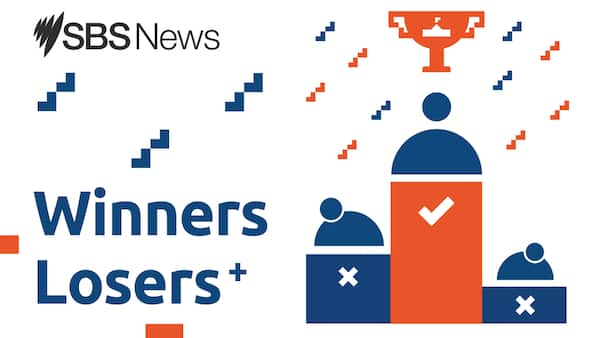
Winners and Losers: Party Time Ep 5
SBS News
25:08
But that backflip didn't extend to the broader attack on the size of the public service. If elected the Liberal Party intends to slash 41,000 Canberra-based jobs.
There is no clarity on which departments those job cuts would come from, apart from assurances that frontline services won't be affected and the cuts won't include forced sackings.
It's no coincidence the ACT is the only state or territory Dutton hasn't visited during the election. e — the Canberra residence of the leader — and opt for the Sydney-based Kirribilli House as his base if elected, also sparked claims from his opponents of hubris.
No visits to remote Indigenous communities
The loss of the Indigenous Voice to Parliament referendum has loomed as one of the Coalition's key lines of critique on the prime minister's first term agenda and judgement.
Labor ran into trouble this week when Foreign Minister Penny Wong appeared on the Betoota Advocate podcast and suggested that, in time, the campaign for the advisory body might be seen like that for same-sex marriage.
Given same-sex marriage is now legal, it opened a window for the Coalition to claim the nationally unpopular Voice to Parliament was still a long-term ambition for Labor. Following the interview, Wong told but it was a gift for Coalition campaign advertising.
Indigenous communities . It had been put forward as a way to in life expectancy, address the suicide rate, and face up to the over-representation of Aboriginal and Torres Strait Islander adults and children in jail.
But the main Indigenous policy issue of contention in the election was whether — meanwhile neither leader managed to make a visit to a remote Indigenous community.
Unexpected addition to election bingo card
It is the combination of the conservative culture wars — from Indigenous affairs to public funding to the education system — that sustain the perception that Dutton has similarities to Trump, aided by his frontbench appointee Jacinta Nampijinpa Price's , coupled with pictures surfacing of her wearing a MAGA cap.
In other areas, Dutton has wanted to set himself apart from the US president, stamping out an internal debate on abortion ahead of the campaign.
One unexpected addition to the election bingo card was the prospect of Russia requesting to station military aircraft at an Indonesian base.
Dutton was quick to frame it as an issue where the government was blindsided by Kremlin encroachment on a near neighbour, but the Opposition leader also , which he had to later concede was a "mistake", as no such statement had been made.
The impact of 'unforced errors'
Towards the end of last year, one of the most senior elders of the Liberal movement was privately relishing Labor's floundering position in the opinion polls.
Referencing Albanese's known enthusiasm for a hit of tennis, the veteran political operator said the Labor leader would understand the impact of his "unforced errors".
But reflecting on the Opposition leader's campaign with its about-face on working from home and regular statements from a "spokesperson" to clear up press conference comments — from electric vehicle policy, to the foreign affairs position on West Jerusalem — the blunders have largely come from Dutton's side.
A campaign focused on trust and lies
The Coalition internally acknowledges it's had a bad campaign but the number of complicated individual seat contests and moving parts in a preferential voting system are mind-boggling. Every politician in this race knows that you can lose the battle and win the war.
Labor is banking on voters being prepared to stick with status quo in a time of uncertainty and being wary of the Coalition's history of budget frugality, fuelled by Dutton's own admission he cannot identify the scale of the savings he wants to make from opposition.
"He cuts, you pay," the Labor advertising blitz warns.
The Liberal Party is sketching its narrative on economic management, trust, and that a former police officer who has been a hardline politician is the right choice to "keep our country safe". On a daily basis they ask people if they feel better off than when Labor came to power.
It's a campaign also focused on trust and lies, which is why the Liberal advertising machine keeps the images of the prime minister toppling off a Newcastle stage — and then contesting that he "fell" — on high rotation.
If the polls are accurate it may come down to a patchwork of crossbenchers — who have the potential to be elected in record numbers this year — with their own policy agendas that help anoint and shape the next government.
The election maths: Two seats versus 23
As it stands, heading into the election, Labor will lose its majority if it loses just two seats, while the Coalition needs to win 23 seats to get a majority.
Albanese still describes it as a "mountain to climb" scenario for Labor to retain its majority.
Dutton still maintains he can take government outright, and refers back to the polling ahead of the 2019 election, which suggested Labor was in an election-winning position, when the outcome ended up being the opposite. But it is a herculean task.
Dutton originally had a two-term strategy. But unless he gains significant ground, his job is likely to be on the line.
A respectable outcome could see season two of this series commissioned.
Visit the to access articles, podcasts and videos from SBS News, NITV and our teams covering more than 60 languages.
